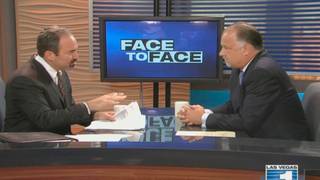Thursday, July 16, 2009 | 2 a.m.
Related Document
Reader poll
Doug Hampton interview, part 2 - July 2009

Viewing video requires the latest version of Adobe's Flash Player
Doug Hampton interview - July 2009

Viewing video requires the latest version of Adobe's Flash Player
Parental Payments

Viewing video requires the latest version of Adobe's Flash Player
Sun Archives
- In D.C., some worry Ensign saga is not over (7-15-2009)
- Ensign gives first Senate speech since acknowledging affair (7-15-2009)
- Ensign to stay in Senate, seek reelection (7-14-2009)
- Silence, not calls for Ensign to quit (7-12-2009)
- If shockers done, Ensign could stay in office, many say (7-11-2009)
- GOP support for Ensign dwindles as new details of affair emerge (7-10-2009)
- Ensign's parents gave Hampton family $96,000 (7-9-2009)
- Hampton portrays Ensign as relentless (7-9-2009)
- Ensign’s pal lacked usual qualifications for top job (7-5-2009)
- Handling the public display of contrition (6-27-2009)
- Off the cuff, Ensign guarded but genial (6-26-2009)
- Fox News had Hampton’s letter earlier than it said (6-24-2009)
- For Ensign, a new lot in Congress (6-24-2009)
- Ensign apologizes during lunch with GOP senators (6-23-2009)
- Back in Washington, Ensign received warmly (6-23-2009)
- Ensign back in D.C.; group plans ethics complaint (6-22-2009)
- In state GOP, Ensign finds few defenders (6-21-09)
For tax accountants, the $96,000 payment Republican Sen. John Ensign’s parents made to the family of the woman with whom he was having an affair is a tantalizing puzzle.
The situation is this: Was the payment to Cynthia Hampton’s family a “gift” as the senator maintains, or was it a severance payment around the time she and her husband left the senator’s employment, as the husband claims?
The answer could have grave ramifications, financial and otherwise, for all parties involved.
This is how the puzzle unfolds.
If Ensigns’ parents structured the payment in eight gifts of the legally allowed limit of $12,000 each to Cynthia Hampton, her husband, Doug Hampton, and two of their three children, as the senator claims, then why was it apparently made in one lump-sum check?
And if the April 2008 payments were “made as gifts, accepted as gifts,” as Ensign’s attorney claims, then why didn’t Doug Hampton check the box as required on his Senate disclosure form that asks whether he or his family had received any gifts?
The box clearly asks, “Did you, your spouse or dependent child receive any reportable gift in the reporting period (i.e. aggregating more than $335 and not otherwise exempt)?”
Doug Hampton, on the final form he filed, checked “no.”
The details are critical because if the payment was a severance, as Doug Hampton claims, Ensign could face felony criminal charges for failing to report the transfer on campaign disclosure forms as would be required.
And if the payment was purposely arranged to avoid taxes, it could be a criminal form of money laundering known as structuring, said Melanie Sloan, executive director of Citizens for Responsibility and Ethics in Washington.
For the Hamptons, the answer is equally critical for their financial situation.
If the payment was a severance, the family would likely owe taxes on the $96,000 — although it is entirely possible that the Hamptons have paid them. The taxes could be up to one-third of the total.
CREW has called for investigations by the Federal Election Commission, Senate Ethics Committee and Justice Department.
Ensign’s office and his attorney declined to respond Wednesday to requests for more information. The Las Vegas Sun sought copies of the canceled check or checks, gift tax forms or agreements between the parties that may explain the situation.
Robert Willens, a tax consultant in New York and adjunct professor in finance at Columbia University’s Graduate School of Business, said the Ensign saga is guaranteed to be written about in the tax journals. He doubted the Internal Revenue Service would let it pass without review at this point.
“Obviously it’s not something that’s going to go under the radar now that everyone knows about it,” Willens said. “There will be scholarly articles, I guarantee you.”
The senator disclosed last month that he had engaged in an affair with Cynthia Hampton, who was his campaign treasurer at the time, from December 2007 to August 2008.
Her husband was one of the senator’s top aides.
Doug Hampton claimed in a televised interview last week with Las Vegas Sun columnist Jon Ralston that his wife was given a severance in excess of $25,000.
CREW responded to the statement by reiterating that such a payment should have been recorded on campaign disclosure forms.
Ensign then disclosed that his father, a wealthy former casino owner, and mother gave the family $96,000 in April 2008, around the time the Hamptons left the senator’s employment.
The payment was structured in a way that shielded his parents from gift tax liability. An unlimited number of $12,000 gifts could be made in the 2008 tax year, experts have said.
Yet questions remain around the definition of a gift.
A landmark 1960 Supreme Court case said that for a recipient to avoid paying taxes on a gift, the donation had to be made out of “detached, disinterested generosity.”
If the Hamptons successfully argue the payment wasn’t made with detached, disinterested generosity but was a severance, they probably will have to pay income taxes on the payment, if they haven’t.
For the Ensigns, the question is whether one $96,000 check can be counted as eight $12,000 gifts.
“If you were in the position of Senator Ensign, you’d want to make the form look just as good as possible and that means it would be preferable, only for cosmetic reasons, to make out separate $12,000 checks to everyone involved,” said Steve Johnson, a professor at UNLV’s Boyd School of Law.
Johnson said that combining the payments into a single check is not a deal-breaker. But the Ensign family would be in a stronger position if it had contemporaneous evidence — either a written or verbal agreement, or third party notification.
Without it, Johnson said, “that’s not as good.”
The parents could still avoid taxes through another mechanism in the tax law, but for the senator, the difference between gift and severance remains critical for campaign law purposes.
Still unknown is why the Ensign parents gave money to just two of the three Hampton children. Experts could not see a tax reason for excluding one of the children, even an adult child. The Hamptons’ oldest son was about to graduate from high school at the time.
And lastly, what would be the violation for Doug Hampton if he considered the payments gifts but failed to disclose them as such on his Senate form? Sloan, of CREW, said it is unlikely Hampton would be investigated for the failure to disclose because he no longer works for the Senate.
“People are talking in two totally different ways that don’t make sense,” she said. “Which all points to why you need an investigation.”

Join the Discussion:
Check this out for a full explanation of our conversion to the LiveFyre commenting system and instructions on how to sign up for an account.
Full comments policy